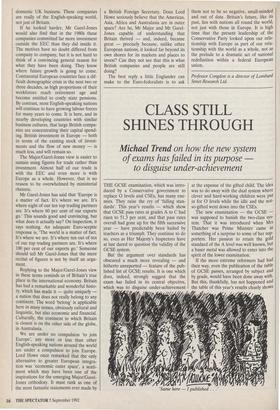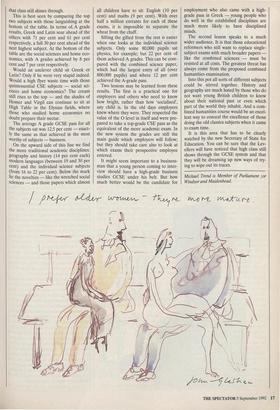CLASS STILL SHINES THROUGH
Michael Trend on how the new system
of exams has failed in its purpose - to disguise under-achievement
THE GCSE examination, which was intro- duced by a Conservative government to replace 0 levels and CSEs, has many ene- mies. They raise the cry of 'falling stan- dards'. This year's results — which show that GCSE pass rates at grades A to C had risen to 51.3 per cent, and that pass rates overall had gone up for the fifth successive year — have predictably been hailed by teachers as a triumph. They continue to do so, even as Her Majesty's Inspectors have at last dared to question the validity of the GCSE system.
But the argument over standards has obscured a much more revealing — and hitherto unreported — feature of the pub- lished list of GCSE results. It is one which does, indeed, strongly suggest that the exam has failed in its central objective, which was to disguise under-achievement at the expense of the gifted child. The idea was to do away with the dual system where clever and hard-working children were put in for 0 levels while the idle and the not- so-gifted went down into the CSEs.
The new examination — the GCSE was supposed to banish the two-class sys- tem. That it was introduced when Mrs Thatcher was Prime Minister came as something of a surprise to some of her sup- porters. Her passion to retain the gold standard of the A level was well known, but a baser metal was allowed to enter into the spirit of the lower examination. If the more extreme reformers had had their way, even the publication of the table of GCSE passes, arranged by subject and by grade, would have been done away with. But this, thankfully, has not happened and the table of this year's results clearly shows 'Same here — I published . . that class still shines through.
This is best seen by comparing the top two subjects with those languishing at the bottom of the table. In terms of_ A grade results, Greek and Latin soar ahead of the others with 71 per cent and 61 per cent respectively, a full 30 per cent ahead of the next highest subject. At the bottom of the table are the social sciences and home eco- nomics, with A grades achieved by 8 per cent and 7 per cent respectively.
Would an unclever child sit Greek or Latin? Only if he were very stupid indeed. Would a high flyer waste time with those quintessential CSE subjects — social sci- ences and home economics? The cream still rises to the top — and the shades of Homer and Virgil can continue to sit at High Table in the Elysian fields, where those who studied home economics no doubt prepare their nectar.
The average A grade GCSE pass for all the subjects sat was 12.5 per cent — exact- ly the same as that achieved in the most worthy of subjects — business.
On the upward side of this line we find the more traditional academic disciplines: geography and history (14 per cent each) modern languages (between 19 and 30 per cent) and the individual science subjects (from 16 to 22 per cent). Below the mark lie the novelties — like the wretched social sciences — and those papers which almost all children have to sit: English (10 per cent) and maths (9 per cent). With over half a million entrants for each of these exams, it is impossible to separate the wheat from the chaff.
Sifting the gifted from the rest is easier when one looks at the individual science subjects. Only some 80,000 pupils sat physics, for example; but 22 per cent of them achieved A grades. This can be com- pared with the combined science paper, which had the largest entry of all (over 800,000 pupils) and where 12 per cent achieved the A-grade pass.
Two lessons may be learned from these results. The first is a practical one for employers and others who need to know how bright, rather than how 'socialised', any child is. In the old days employers knew where they were. They respected the value of the 0 level in itself and were pre- pared to take a top-grade CSE pass as the equivalent of the more academic exam. In the new system the grades are still the main guide which employers will follow; but they should take care also to look at which exams their prospective employee entered.
It might seem important to a business- man that a young person coming to inter- view should have a high-grade business studies GCSE under his belt. But how much better would be the candidate for employment who also came with a high- grade pass in Greek — young people who do well in the established disciplines are much more likely to have disciplined minds.
The second lesson speaks to a much wider audience. It is that those educational reformers who still want to replace single- subject exams with much broader papers like the combined sciences — must be resisted at all costs. The greatest threat has always come from the proposed combined humanities examination.
Into this pot all sorts of different subjects could be stirred together. History and geography are much hated by those who do not want young British children to know about their national past or even which part of the world they inhabit. And a com- bined humanities course would be an excel- lent way to conceal the excellence of those doing the old classics subjects when it came to exam time.
It is this area that has to be clearly watched by the new Secretary of State for Education. You can be sure that the Lev- ellers will have noticed that high class still shows through the GCSE system and that they will be dreaming up new ways of try- ing to wipe out its traces.
Michael Trend is Member of Parliament ;or Windsor and Maidenhead.



















































 Previous page
Previous page